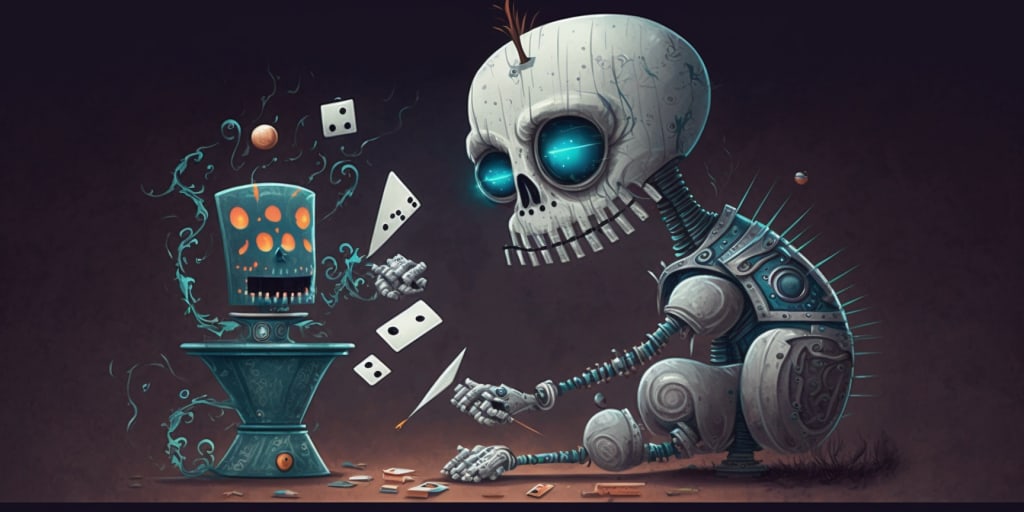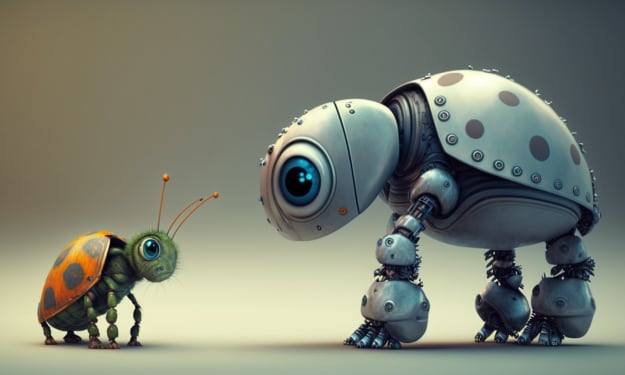A Deeper Look at AI's Potential Downsides
There are downsides, aren't there?

Artificial intelligence (AI) has been touted as a revolutionary technology that can revolutionize many aspects of life, from self-driving cars to the automation of complex tasks. However, while AI promises tremendous potential benefits, it also raises important questions about its potential downsides and unintended consequences. In this article, we will take a deeper look at some of the potential risks associated with AI, including ethical issues, economic disruption, and security concerns.
Learn more about AI at AI-Info.org - Learn about AI
AI's Potential Downsides
One of the biggest concerns with AI is its potential to exacerbate existing inequalities. For instance, if AI algorithms are trained on biased data, they may perpetuate and even amplify discriminatory practices. This could lead to unfair outcomes in areas like hiring, lending, and criminal justice. Additionally, some worry that AI will lead to job loss as machines become more adept at tasks previously performed by humans.
Another downside of AI is its potential for misuse by those with nefarious intentions. For example, hackers could use malicious AI algorithms to steal personal information or compromise security systems. Similarly, governments or corporations might use AI for surveillance purposes or other unethical activities.
Finally, there are concerns about the morality of creating machines that can think and act autonomously. As AI becomes more advanced and capable of making decisions on its own (a concept known as "artificial general intelligence"), questions arise about who should be held responsible when things go wrong. Should we hold the creators of these machines accountable? Or should we treat them as autonomous entities with the moral agency?
Moral Implications
One of the major concerns surrounding the development of Artificial Intelligence (AI) is its moral implications. As AI technology becomes more advanced, it raises several ethical questions that need to be addressed. For instance, who will be held responsible if an AI system causes harm or malfunction? Is it possible for an AI system to have bias, prejudice, or discrimination like humans? How will we ensure that these systems are developed with transparency and accountability?
Another major issue is job displacement due to automation. With many industries already implementing automated processes, there has been a rise in concern over what this means for workers in these fields. The loss of jobs could lead to a widening economic divide between those who benefit from automation and those who do not.
Additionally, there are concerns about privacy violations as companies collect vast amounts of data through AI-powered tools. There is a growing need for regulation on how organizations can use this data without violating individual rights and freedoms. These issues must be addressed proactively to ensure that the development of AI technology does not come at too high a cost.
Security Concerns
One of the biggest concerns surrounding artificial intelligence (AI) is security. As AI technology continues to advance, so do the risks associated with it. With more and more data being collected and analyzed by AI systems, there is an increased risk of that data being accessed by cybercriminals or other malicious actors.
Another security concern with AI is the potential for bias in its decision-making. Many machine learning algorithms are trained on large datasets that may contain inherent biases, which can lead to discriminatory decisions when used in real-world applications. Additionally, as AI becomes more integrated into our everyday lives – from self-driving cars to healthcare – there are growing concerns about privacy and how personal information will be protected.
Overall, while the benefits of AI are numerous, it's important to acknowledge and address these potential downsides to ensure that this technology is developed and deployed responsibly. This means investing in robust cybersecurity measures, ensuring transparency and accountability in decision-making processes, and prioritizing ethical considerations throughout all stages of development.
Social Impacts
AI has the potential to bring about several social impacts, both positive and negative. The increased automation of jobs could lead to job displacement for many workers, especially those working in manufacturing and customer service industries. This could result in an increase in unemployment rates and a possible rise in income inequality. Additionally, AI-powered decision-making systems may perpetuate existing biases or introduce new ones, leading to discrimination against certain groups.
On the other hand, AI can also bring about positive social impacts. It has the potential to revolutionize healthcare by improving disease diagnosis and treatment options through predictive analytics. AI can also assist law enforcement agencies with crime prevention and detection by analyzing large amounts of data more efficiently than human investigators. Furthermore, AI-powered virtual assistants like Siri and Alexa have made daily tasks easier for many people with disabilities.
Overall, it is important to consider both the positive and negative social impacts of AI as its integration into society continues to grow rapidly. By acknowledging these implications upfront, we can work towards mitigating any potential downsides while maximizing its benefits for all members of society.
Economic Repercussions
One of the major concerns surrounding artificial intelligence (AI) is its potential impact on the economy. As AI technology advances, there is a fear that it could lead to job displacement and unemployment in various industries. For example, robots and automation are already replacing human workers in manufacturing and logistics jobs.
Additionally, the rise of AI could widen the wealth gap between those who have access to this technology and those who do not. Small businesses may struggle to keep up with larger corporations that can afford to invest in AI, leading to further consolidation of power within certain industries.
On a macroeconomic level, if AI leads to widespread job displacement or increased income inequality, it could negatively affect consumer spending and ultimately slow down economic growth. However, proponents of AI argue that these negative impacts can be mitigated through policy measures such as retraining programs for displaced workers and implementing regulations around the use of AI in hiring processes.
Potential Health Hazards
As artificial intelligence (AI) continues to grow and become a more integral part of our daily lives, it's important to consider its potential health hazards. One major concern is the impact that AI could have on mental health. For example, studies have shown that excessive use of social media can lead to increased feelings of anxiety and depression. With AI algorithms constantly mining our online activity, there is a risk that these negative impacts could be amplified.
Another health hazard related to AI is the potential for physical harm. Autonomous vehicles, for instance, hold great promise in terms of reducing traffic accidents and fatalities; however, the technology is not yet perfect and some accidents involving autonomous vehicles have resulted in injury or death. Additionally, there are concerns about the impact that prolonged exposure to electromagnetic radiation from devices like smartphones may have on our long-term health.
Overall, while AI offers many exciting possibilities for improving our lives and society as a whole, it's important to carefully consider its potential downsides so that we can minimize any negative impacts on our physical and mental well-being.
Environmental Risks
One of the potential downsides of AI is its impact on the environment. The energy consumption required for training and running AI models is significant, and as demand for these models increases, so does the amount of energy needed to power them. This increased energy consumption can lead to higher carbon emissions and contribute to climate change.
Another environmental risk associated with AI is the potential for e-waste. As technology advances at a rapid pace, older models become obsolete and are often discarded. The components used in these devices can contain hazardous materials that can harm both humans and the environment if not properly disposed of.
As AI continues to evolve, it's important to consider its potential environmental impacts and take steps to mitigate them. This could include developing more energy-efficient algorithms, using renewable energy sources, or implementing responsible recycling practices for outdated technology. By doing so, we can ensure that the benefits of AI don't come at too high a cost for our planet.
Conclusion: Assessing the Risks
Assessing the potential downsides of artificial intelligence (AI) is a complex task that requires a deeper understanding of the technology's capabilities and limitations. One significant downside of AI is its bias towards certain groups or outcomes, which can lead to discrimination or unfair treatment. This bias is often rooted in the data sets used to train AI algorithms, which may be incomplete or skewed.
Another potential downside of AI is its impact on employment. As machines become more capable of performing tasks once done by humans, there are concerns about job displacement and wage inequality. While some argue that AI will create new jobs and economic opportunities, others worry that these benefits will not outweigh the costs.
Overall, assessing the potential downsides of AI requires careful consideration of both its benefits and drawbacks. As this technology becomes increasingly ubiquitous in our daily lives, individuals and organizations alike need to understand how it works and how it can be used responsibly.
About the Creator
Patrick Dihr
I'm a AI enthusiast and interested in all that the future might bring. But I am definitely not blindly relying on AI and that's why I also ask critical questions. The earlier I use the tools the better I am prepared for what is comming.






Comments
There are no comments for this story
Be the first to respond and start the conversation.